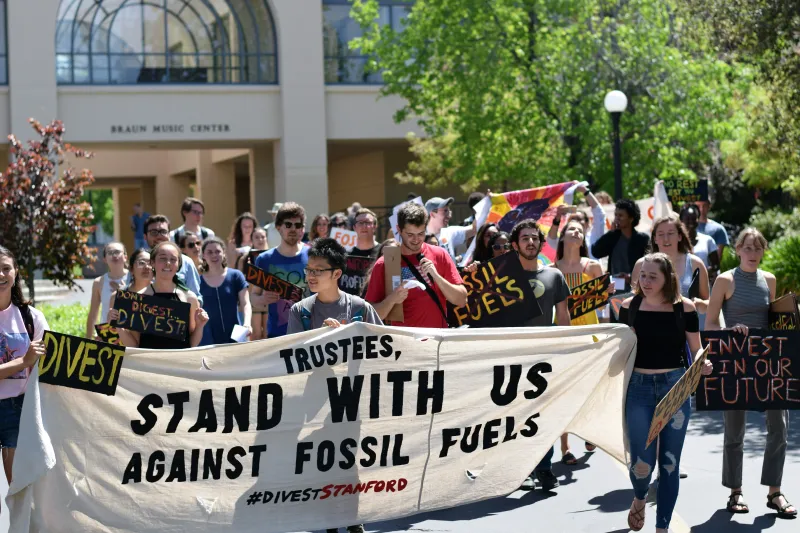Advocates for Stanford’s full divestment from fossil fuels marched on Friday afternoon to deliver their proposal to Vice Provost for Student Affairs Susie Brubaker-Cole. Around thirty community members and students chanted and marched from Columbae lawn to the front of the Stanford Bookstore to Main Quad.
The rally, organized by the student organization Fossil Free Stanford, took place during the Admit Weekend activities fair and culminated in the delivery of a formal report to Brubaker-Cole.
“I accept this petition with gratitude for your activism, with gratitude for the thoughtfulness that I know is in there,” Brubaker-Cole said upon receiving the report. “I haven’t read it yet but I trust based off of your remarks today that a lot of thought went into this.”
Brubaker-Cole then informed the students that she would deliver to the proposal to senior University administrators including University President Marc Tessier-Lavigne and Provost Persis Drell.
The rally and march featured a variety of speakers, including student activists, student government leaders and professors.
Rebecca Behrens ’19 spoke on behalf of Fossil Free Stanford.
“There has never been a level of international organizing on this scale before for climate action,” she said. “We have a new level of climate organizing happening, and I’m so excited that Stanford is a part of this and [that] Stanford has a chance to lead on this.”
Incoming Associated Students of Stanford University (ASSU) Senator Sam Schimmel ’22 discussed his experience living in Alaska, and how climate change has affected indigenous Alaskans.
“Climate change is real,” he said. “While it is a reality that my community deals with the resulting impacts we also recognize the opportunities and economic benefits the petrochemical industry provides. Where I am from we do not have the resources to convert to fossil free alternatives for heating our homes and for the vehicles we use for subsistence. Native country suffers from a lack of infrastructure but holds some of the greatest promise for emerging green industries however it would be hurt most by divestment.”
Maya Burke ’18 M.A. ’19 — who helped organize the Students for Environmental and Racial Justice (SERJ) walk-out earlier this month — also emphasized the intersection between environmental injustice and racism.
“SERJ stands in support of [Fossil Free Stanford’s] efforts, demanding what must be done if we are to pursue collective intellectual work that can hold any water,” she said. “Students who have organized on this campus … are not expecting some one-day turnover to undo racial terrorization, oil dependency or anti-Indigenous and anti-black violence. What marginalized and/or concerned students are demanding is urgency, transparency, action and intention.”
Once the march had arrived in front of Tessier-Lavigne’s office, incoming ASSU President Erica Scott ’20 spoke in support of fossil fuel divestment.
“We will make it clear to the University administration that this should be a priority,” Scott said.
Scott’s attendance at the rally lined up with one of her campaign promises — made with her running mate Isaiah Drummond ’20 — to ensure access and accountability. Framing herself as an institutional ally for students, Scott contextualized total fossil fuel divestment as an answerability issue for the administration.
“At the end of the day, I like to think that fossil fuel divestment is about holding the administration accountable to its own stated priorities,” she said. “At a trustee meeting, the Board of Trustees adopted a new statement about ethical investment.”
Scott’s statement was made in reference to the Board of Trustees December 2018 announcement of the Stanford Management Company’s (SMC) first-ever Ethical Investment Framework. Previously, a now-dissolved Advisory Panel on Investment Responsibility had recommended against total fossil fuel divestment.
Since then Fossil Free Stanford has coordinated different efforts for fossil fuel divestment including co-hosting an event with the Women’s Community Center over the intersections of environmental injustices and gender inequities. First-year Fossil Free Stanford organizer Zoe Brownwood ’22 met in office hours with President Tessier-Lavigne and Chief of Staff to the President Megan Pierson to discuss the role of the Office of the President in Stanford’s divestment procedure.
The Statement on Investing Responsibility currently requires an investment to qualify as “abhorrent and ethically unjustifiable” in order for divestment to occur. Scott attempted to make that case in her speech.
“This transcends politics,” she said. “Climate change is an issue that directly affects all of us as humans … The fossil fuel industry does perpetuate what I would call ethically unjustifiable behavior. We all know that low income [people], people of color, indigenous populations and others who are vulnerable face the greatest harm as a result of climate change.”
Comparative literature professor David Palumbo-Liu followed Scott’s speech by urging students to look at fossil fuel divestment through multiple frameworks.
“It is very important to think of this holistically,” Palumbo-Liu said. “You have to understand the intersection between climate change and capitalism … What is driving the production of pollution, what is allowing capitalism to thrive, and it goes back to [Scott’s] remarks about vulnerable populations, because if you look at what [right-wing Brazilian president Jair] Bolsonaro is doing [to] the rain forests, what [President Donald] Trump is doing selling public lands, this is part of a capitalist-fascist nexus.”
Behrens followed Professor Palumbo-Liu to conclude the speaker lineup.
“I have been organizing with this campaign for four years now and I’ve been lucky to organize four years of organizing on this campus,” Behrens said. “This moment feels so different than it ever has before.”
After the conclusion of her speech, Behrens handed the fossil fuel divestment report to Brubaker-Cole, who personally walked out to meet students.
“I wish you perseverance and luck and rigor in everything you do with this process going forward,” Brubaker-Cole added.
Read the full text of the report delivered by Fossil Free Stanford here.
Contact Richard Coca at richcoca ‘at’ stanford.edu.
